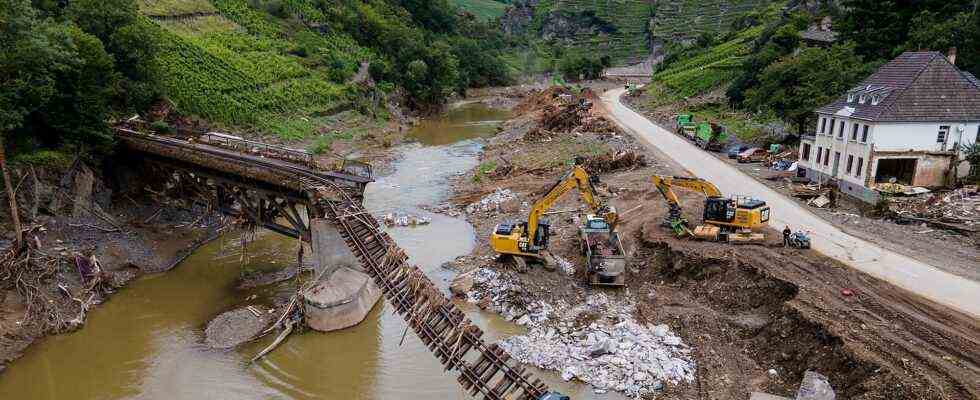Exclusive
Status: 25.08.2021 02:50 a.m.
Many people in the Ahrweiler district are still suffering from the effects of the flood disaster. Tons of alluvial debris still lie there. It’s slow. And it is completely unclear whether the dirt is harmful to health.
Mario Frings stands in front of the smoking remains of his campsite in Blankenheim, North Rhine-Westphalia. Next to it there is a leveled field where camping cars used to be. The place right on the Ahr was internationally popular before the small stream turned into a raging tide, says Frings. The masses of water would have destroyed 50 years of family tradition in just six hours: “It hurts me a lot. We run three campsites with the Frings family and two are completely total write-offs.” As a result, the family was missing 60 percent of the income.
In North Rhine-Westphalia, the rubbish was gone quickly
In the meantime, things are looking better in North Rhine-Westphalia. The garbage and all the debris are removed. Not so on his campsite in Rhineland-Palatinate. After more than five weeks there are still tons of rubbish, scrap and debris lying here. Volunteers have pushed everything into large piles. But, according to Frings, they couldn’t drive away for the most part. The mayor did not provide him with sufficiently large intermediate landfills nearby: “As long as it is still here, we cannot check the infrastructure and we cannot go any further beforehand,” he says.
Frings wonders why things are not going well. The mayor responds to a request from Report Mainzthat there is too little space. Intermediate landfills have been created in consultation with the private owners. But “personal interests of individuals who are not in the common good are classified as subordinate.” In addition, intermediate landfills are actually a matter for the district. This refers to the almost infinite amounts of garbage that would have to be removed.
But a lot has already been removed. And there is now a disposal concept for the building rubble, which is being added in ever larger quantities, says Horst Gies, first deputy of the Ahrweiler district administration. “I can only point out to people that it is rubbish that would otherwise be produced in 25 years. And we simply cannot do it. Even with a lot of help within four or five weeks. Sad as it is. But everything will start up there Put some energy into it, “says Gies.
The flood damage can also be seen weeks after the disaster – here the aerial photo of a destroyed area in Altenahr in the Ahrweiler district.
Image: EPA
Garbage causes psychological stress
The amount of rubbish is a problem, especially for older people. Especially if it is not transported away for a long time. This is the case, for example, of Inge from Bad Neuenahr-Ahrweiler. Every day she struggles with her rollator through the rubble and past heavy equipment. Her goal: a privately organized food distribution, because after five weeks she still has no electricity at home: “This is no longer life. Sometimes you don’t even want to get up in the morning when you see the rubbish there. Mountains of rubbish. Then I go to the kitchen, there is a tree. Then I’ll see something else. “
The psychological strain is immense, says the emergency chaplain Gabriele Merten, who has been in the area for weeks: “You just have to say that this simple topic of rubble, rubbish, rubbish weighs on your shoulders like an anvil.” Her colleague Christoph Schomer agrees. There are even arguments and physical attacks because people have bare nerves.
Health hazards from garbage and dust?
The garbage not only presses on the psyche. Numerous residents and helpers report rashes and coughs. Wilhelm Hartmann also complains about the dust. The entrepreneur from Fulda has been a helper from the very beginning. He helped organize hundreds of volunteers with machines and called them to the Ahr valley.
Now he feels responsible. He is burdened not only by the dust, but also by the uncertainty that there are “no official values yet” that are specifically included everywhere. Upon request from Report Mainz informs the Ministry of the Environment of Rhineland-Palatinate that a soil investigation program is to be implemented shortly. The on-site crisis team cannot rule out health risks.
The authority therefore recommends that helpers and residents wear masks and gloves. But there is currently no knowledge about health risks. The district administration, however, would like more information. In an interview, Horst Gies from the Ahrweiler district administration says: “It would certainly be desirable if appropriate tests were carried out across the board in order to be sure and to know what the contamination is. There will be areas where values are likely to be exceeded. “
Wilhelm Hartmann, the volunteer from Fulda, is now taking soil samples himself. The first results show increased values for oil, gasoline and lead. Just a first sample. But this shows him that the authorities absolutely have to get the garbage chaos under control.

